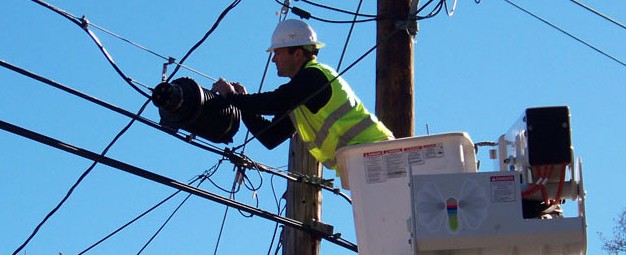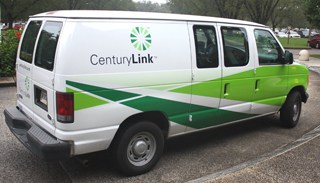
Slaterville Springs is a hamlet in the town of Caroline, N.Y.
Frontier Communications issues press releases promoting the expansion of low speed DSL service into new areas, but for many existing customers, extended service outages ruin their broadband experience.
Just ask Stop the Cap! reader Paul from Slaterville Springs, just outside of Ithaca, N.Y. Much of his hamlet was without Frontier’s DSL service for more than two weeks, leaving dozens of families with poor-to-non-existent access to broadband for the better part of January.
It Was Supposed to Be Restored in Two Days — But Three Weeks Was More Like It
“It was supposed to be restored in two days, but after repeated calls, they told me it was a “common cause” failure impacting a large number of subscribers,” Paul told us. “Later, we were told Frontier was waiting for parts to fix some equipment at the central office.”
Paul heard the same excuse a week later, as he and other local residents remained cut off from the Internet.
Paul has been underwhelmed by the attention Frontier has given to the town of Caroline, which includes Slaterville Springs. He has complained to the town supervisor and the New York Public Service Commission. Frontier has already offered him a refund for the extended interruption in service, but Paul would really like a stable Internet connection that performs well with today’s bandwidth-intensive Internet.
 “Before the outage, I got about two-thirds of the promised 3Mbps speed from Frontier, which means any interactive applications can be difficult, and YouTube videos require lengthy buffering before one can watch,” Paul says. “I think being able to watch YouTube without painful slowdowns should be a key metric for today’s broadband.”
“Before the outage, I got about two-thirds of the promised 3Mbps speed from Frontier, which means any interactive applications can be difficult, and YouTube videos require lengthy buffering before one can watch,” Paul says. “I think being able to watch YouTube without painful slowdowns should be a key metric for today’s broadband.”
At the end of January, Paul reached out to Ann Burr, Frontier’s regional president of operations. She called up Claudia Maroney, the general manager of Frontier’s Central New York division.
“I was told right away that I’d get a service credit for two months and that the problem would be dealt with quickly,” Paul said. “The technician in the central office contacted us and said the solution was to further reduce my speed, because he thought we were too far away from the central office to sustain even the slow speed we had before.”
That turned out not to solve the problem either.
Finally, Frontier brought Paul a new DSL modem which, in concert with repairs in the central office, finally resolved his problems.
Frontier claims it will also increase capacity in his area, which apparently also suffers from evening congestion.
Poor Internet service is not just limited to Caroline. The entire Southern Tier region between Corning and Binghamton is hard-pressed to access high-speed service.
Eleven towns in Tompkins and Cayuga County have jointly applied for a federal grant to create the infrastructure needed to make high speed wireless or fiber optic-to-the-home service available throughout the area.
The Case of Proctor Creek and Coffield Ridge, W.V.

Wetzel County, W.V.
One of the most challenging areas to provide DSL service is in the Panhandle section of West Virginia. Hilly terrain and large distances between neighbors assure a challenging broadband environment. Cable television is out of the question in many areas, and Verizon’s legacy network was in decrepit condition before selling operations to Frontier and fleeing the state.
So it was with great excitement Frontier announced incremental progress in expanding DSL service to two small sections of Wetzel County. Proctor Creek, close to the West Virginia-Ohio state line, and the relentlessly hilly Coffield Ridge area was finally getting DSL from Frontier — three years after Verizon promised to make the service available.
Wetzel County EMS President Jim Colvin and Del. Dave Pethtel joined Frontier’s Bill Moon at the Grandview EMS Squad station on Jan. 4, to learn more about Frontier’s expansion plans, as the Wetzel Chronicle reported.
Moon informed customers that DSL was now available in both areas and it’s only the beginning of Frontier’s plans to deliver expanded broadband service across West Virginia. He said Frontier aims to “do things right the first time,” taking more time to establish service in efforts to prevent customers from dealing with the inconveniences of repeat visits from technicians.
“We want to bring the feel of a local company with the advantages of a big company,” Moon said. He went on to say that being a manager specifically for one region meant day-to-day decisions could be made at the local and personal level. “A lot of the red tape is gone,” he told the Chronicle. “We can make things happen directly and get things resolved quickly.”
 “There is nothing quick or personal about Frontier Communications,” Shirley tells Stop the Cap! from her home in Proctor. Her sister signed up for Frontier’s broadband service Jan. 15, and it has worked for exactly three days. “She has never dealt with a more disorganized company.”
“There is nothing quick or personal about Frontier Communications,” Shirley tells Stop the Cap! from her home in Proctor. Her sister signed up for Frontier’s broadband service Jan. 15, and it has worked for exactly three days. “She has never dealt with a more disorganized company.”
Shirley says nobody from Frontier ever marketed DSL to her sister’s family.
“I read the story in the Chronicle and called her right away, because they have been waiting for broadband for at least 10 years,” Shirley says. “Calling Frontier was the first mistake — the company couldn’t bring up her account for 15 minutes.”
Shirley says her sister finally succeeded in ordering the service after her line was “qualified.” She specifically told Frontier “no thanks” to a heavily pushed big package of services from the company, and she did not want to get into a term contract. But Frontier signed her to one anyway.
“Installation turned out to take almost two weeks because the installer never showed up and she actually got her first bill with DSL charges on it before they installed the service,” Shirley says. “She called me right away — they signed her up for a calling plan she didn’t want, a hard drive backup service she never ordered, and a one year contract she won’t accept.”
Frontier took all of the extra services off her bill without a fight, even as she still waited for the installer to show up.
“It worked for three days — three days,” Shirley reports. “Ever since the last heavy rain, the modem lights just blink and Frontier tells her it must be a line problem, but she’s still waiting for someone to come fix it.”
Frontier is charging Shirley, and her neighbors, nearly $40 a month for 1.5Mbps DSL service. It was supposed to be 3Mbps, but Moon admitted to residents the farther a customer is from a hub, the slower the connection will be.
Common Congestion Symptoms? Frontier Promises Relief

National Radio Astronomy Observatory in Green Bank
Meanwhile, residents in Pocahontas and Webster counties in eastern West Virginia have DSL service, but intolerable congestion has made it practically unusable since last Thanksgiving.
Nate in Marlinton has had DSL service since Verizon ran it, and believes Frontier has successfully run DSL straight into the ground in the state.
“Frontier actually managed to achieve slower speeds than my neighbor’s satellite Internet service, which is simply amazing,” Nate tells Stop the Cap! “He had Frontier DSL as well, but he went back to the satellite because it was actually better in the evenings.”
Nate’s in a good position to know he has a good quality line to Frontier’s central office — he can see the building from his house.
“When Verizon ran DSL, I actually got better speeds than they promised because you can count the line length between me and the central office in yards, not tens of thousands of feet,” Nate says. “Now the problem is with Frontier’s own pipeline to the rest of the Internet, which has become hopelessly congested.”
Nate criticizes Frontier for claiming their network has loads of fiber optics for their broadband service.
“Not for ordinary West Virginians they sure don’t,” Nate says.
The Pocahontas Times covered Frontier’s molasses-slow broadband speeds, getting promises that better broadband was on the way late last week.
“But you have to read further down in the story to find the company is spending its time, attention, and money on a fiber network connecting the National Radio Astronomy Observatory in Green Bank with West Virginia University in Morgantown,” Nate complains. “Although that fiber travels down the same phone poles and streets our phone lines do, that sure doesn’t mean we’ll be able to access it.”
Reed Nelson, Frontier’s Director of Engineering for West Virginia, vaguely offered the $5.9 million, 66-mile fiber project will indirectly benefit consumers through fiber loops installed along the way. He was joined by an apologetic Dana Waldo, Frontier’s senior vice president for West Virginia.
“We know we’ve had some bumps in the road,” Waldo said at the outset of the meeting.
“This is very much like being on the Interstate highway at rush-hour,” he said. “It gets congested. What we’re trying to do is look for paths where we can reduce that congestion. That’s the short-term fix.”
Nate remains unimpressed.
“This is a residential broadband improvement project through osmosis — somehow Frontier’s congested network problems in the area will be resolved by an institutional network we cannot access,” Nate says. “The fact the company turned up at the Observatory to make these announcements before an audience of NRAO technical and executive staff, Pocahontas County Commissioners and representatives of the local schools and libraries, tells you all you need to know — this is an institutional, not residential network.”

Pocahontas County's Cranberry Glades: Go for Nature's Mountain Playground, but don't stay for Frontier's broadband.
Our regular reader DJ, also in the affected area, says speeds have been downright terrible since Thanksgiving, and despite Frontier’s “new capacity” coming online last week, his service is as slow as ever.
“I’m getting anywhere between 0.5Mbps – 2Mbps if I’m lucky,” he shares.
For most customers in eastern West Virginia, Frontier’s ironically-named High Speed Max service delivers a whopping 1Mbps broadband experience.
“Customers have been paying for value not received,” Pocahontas County Commissioner Martin Saffer told Nelson.
Constituents in both counties regularly complain to elected officials about the dreadful broadband service Frontier delivers.
“This company got more than one hundred million in broadband stimulus funding and it sure isn’t helping people in eastern West Virginia,” Nate says.
Another part of Frontier’s problems is an overcongested access point in Bluefield, where Frontier exchanges traffic with the Internet’s national backbone. Sending the majority of the state’s traffic through one data center has proved untenable, so the company plans additional access points in Charles Town, Charleston, and Clarksburg.
Frontier promises speed boosts are forthcoming, bringing 5Mbps service in the days ahead, according to the Times.
John Mutscheller, Frontier’s Technical Supervisor in Marlinton, told the Times local crews are working to increase capacity whenever they go out to service equipment in Pocahontas County.
“When we put in a new site or we augment an existing site, if they’re at one meg–we have some at three–we’re jumping them up to 5 megs,” he said. “That’s the company policy.”
An installation at Thornwood will be the first 5 Mbps site to come online in Pocahontas County, Mutscheller said. Eventually, all sites in the county will be upgraded to that level, he said.
But as the newspaper points out, not everyone will get those speeds. Generally, with the copper lines that connect customers to Frontier’s equipment, connection speeds drop off as the distance from the equipment increases. Nelson said advances in modems, like those Frontier provides customers for connecting to its network, could fix that in coming years.
 Frontier continues to navigate political minefields in the state with the help of employees hired from county governments. Reta Griffith, a former county commissioner today is Frontier’s General Manager for the territory that includes Pocahontas County.
Frontier continues to navigate political minefields in the state with the help of employees hired from county governments. Reta Griffith, a former county commissioner today is Frontier’s General Manager for the territory that includes Pocahontas County.
Reporters pressed Griffith on the question of refunds for beleaguered customers experiencing very un-broadband speeds from Frontier:
“We will take those concerns into consideration,” Griffith responded.
Frontier’s service agreements with customers state that speeds received are not guaranteed, but rather will be ‘up to’ the specified speed, she added.
Frontier’s own marketing materials have added to the billing headaches of the company and its customers.
“‘High Speed Max’ doesn’t mean the same thing every place,” Griffith explained.
 Rep. Marilyn Avila’s (R-Time Warner Cable) anti-community broadband bill will be up for a vote this Wednesday in the Public Utilities Committee (Room 643, 12 noon) in the state legislature.
Rep. Marilyn Avila’s (R-Time Warner Cable) anti-community broadband bill will be up for a vote this Wednesday in the Public Utilities Committee (Room 643, 12 noon) in the state legislature.

 Subscribe
Subscribe
















